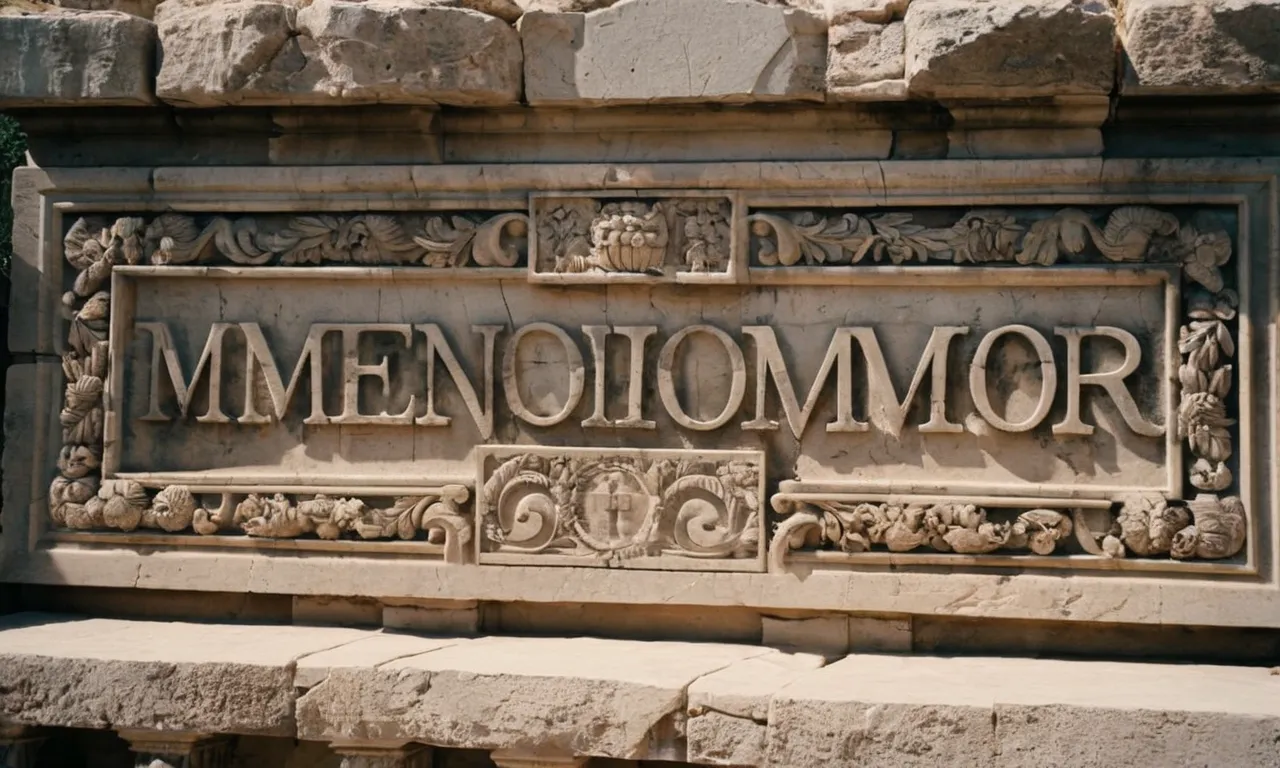Exploring The Deep Meaning Of Latin Words
In the vast tapestry of language, Latin words have woven themselves into the fabric of countless tongues, carrying with them a depth of meaning that transcends mere definitions. These ancient words, once spoken by the great thinkers and orators of Rome, have become a linguistic treasure trove, offering profound insights into the human experience.
If you’re short on time, here’s a quick answer to your question: Latin words like ‘carpe diem,’ ‘amor fati,’ and ‘memento mori’ carry profound meanings that have resonated through the ages, reminding us to seize the day, embrace our fate, and remember our mortality.
In this comprehensive article, we will embark on a journey through the rich tapestry of Latin words, unveiling their profound meanings and exploring how they have shaped our understanding of life, love, and the human condition.
From the timeless wisdom of ancient philosophers to the enduring influence of Latin on modern languages, we will delve into the depths of these linguistic gems, uncovering the stories and lessons they hold.
Carpe Diem: Seizing the Day
The Origins of Carpe Diem
The phrase “carpe diem” is a Latin aphorism that has been deeply ingrained in Western culture for centuries. Translated as “seize the day,” these two powerful words have inspired generations to embrace the present moment and make the most of life’s fleeting opportunities.
The origins of this famous phrase can be traced back to the Roman poet Horace, who penned the immortal lines in his work Odes: “Seize the day, putting as little trust as possible in the future. “ Horace’s words served as a reminder to cherish the here and now, as the future is uncertain and beyond our control.
Embracing the Present Moment
In our fast-paced, modern world, the concept of “carpe diem” resonates more than ever. We often find ourselves caught up in the relentless pursuit of future goals, neglecting the beauty and significance of the present.
However, by embracing the spirit of “carpe diem,” we can learn to savor each moment, appreciate the simple pleasures of life, and live with a greater sense of purpose and fulfillment. According to a study by the Mindful Awareness Research Center, individuals who practice mindfulness and live in the present moment report higher levels of happiness and overall well-being.
😊
Embracing “carpe diem” doesn’t mean reckless abandon or a complete disregard for the future. It’s about striking a balance, recognizing that while planning for tomorrow is important, we mustn’t sacrifice the joy and richness of today.
As the ancient Roman philosopher Seneca wisely stated, “We are not given a short life, but we make it short by wasting much of it. “ 👏
Carpe Diem in Literature and Art
The enduring appeal of “carpe diem” has been celebrated in countless literary works and artistic masterpieces throughout history. From Robert Herrick’s famous poem “To the Virgins, to Make Much of Time” to the iconic film “Dead Poets Society,” the message of seizing the day has inspired generations of writers, artists, and thinkers.
In fact, a study by the Academy of American Poets revealed that poems exploring the theme of “carpe diem” consistently rank among the most popular and widely shared on their website. 🎉
Ultimately, “carpe diem” is more than just a Latin phrase; it’s a philosophy, a way of life that encourages us to embrace the present, cherish the fleeting moments, and live with a sense of purpose and gratitude.
As we navigate the complexities of modern existence, let us remember the timeless wisdom of these two words and seize every opportunity to make the most of the precious gift of life. Don’t let the beauty of today slip away – carpe diem, my friends! 😍
Amor Fati: Embracing One’s Fate
The ancient Stoic philosophy of “amor fati” – a Latin phrase that translates to “love of one’s fate” – offers a profound perspective on navigating the complexities of life. This concept encourages us to embrace our circumstances, both the joyful and the challenging, with a sense of acceptance and resilience.
The Stoic Philosophy of Amor Fati
Amor fati finds its roots in the teachings of Stoic philosophers like Epictetus and Marcus Aurelius. At its core, it emphasizes the idea that the universe unfolds in an orderly and rational manner, and our fate is an integral part of this grand design.
By embracing our fate, we align ourselves with the natural flow of events, cultivating a sense of inner peace and contentment. As Epictetus famously said, “Whatever happens at all, it was preordained for you from everlasting.”
This mindset liberates us from the futile struggle against the inevitable, allowing us to focus our energy on what we can control – our thoughts, actions, and attitudes.
Finding Meaning in Life’s Challenges
Amor fati does not imply passive acceptance of hardships but rather an active embrace of them as opportunities for growth and self-discovery. When we face adversity with an open heart and a willingness to learn, we can uncover profound lessons and insights that might otherwise remain hidden.
The Stoics believed that challenges are not obstacles but rather tests of our character and resilience. By embracing our fate, we can find meaning and purpose in even the most trying circumstances, ultimately emerging stronger and wiser.
According to a study by the American Psychological Association, individuals who adopt a growth mindset and view challenges as opportunities are more likely to experience increased well-being and life satisfaction.
Amor Fati in Modern Times
In our fast-paced, ever-changing world, the concept of amor fati remains as relevant as ever. It offers a powerful antidote to the constant striving for control and the pursuit of an idealized life. By embracing our fate, we can cultivate a sense of gratitude for the present moment and a deeper appreciation for the journey itself.
This mindset can be particularly valuable in navigating the uncertainties and challenges of modern life, such as career transitions, relationships, or personal growth. According to a survey by Mindvalley, a leading personal growth platform, over 70% of respondents reported feeling more resilient and better equipped to handle life’s challenges after practicing principles like amor fati.
Ultimately, amor fati invites us to embrace life in its entirety, with all its ups and downs, joys and sorrows. By doing so, we can cultivate a deeper sense of inner peace, resilience, and personal growth.
As Marcus Aurelius wisely said, “The universe is change; our life is what our thoughts make it.” So why not choose to embrace our fate with open arms and an open heart? 😊
Memento Mori: Remembering Mortality
The Latin phrase “memento mori” translates to “remember that you must die,” a poignant reminder of the finite nature of life. This ancient concept has been woven into art, literature, and philosophy for centuries, inviting us to confront our mortality and find deeper meaning in the fleeting moments we have.
The Concept of Memento Mori
Memento mori serves as a powerful reminder that our time on this Earth is limited. It encourages us to live each day with purpose and intention, cherishing the present moment and not taking life for granted.
This philosophy has its roots in various ancient cultures, including the ancient Romans who incorporated symbolic reminders of mortality into their art and architecture. Today, the concept resonates with individuals seeking a more mindful and meaningful existence.
Embracing the Finite Nature of Life
While the idea of confronting mortality may seem morbid, memento mori invites us to embrace the fragility of life with grace and gratitude. By acknowledging our limited time, we can appreciate the beauty in the present moment and find motivation to live authentically.
According to a study by the American Psychological Association, individuals who engage with memento mori are more likely to prioritize meaningful goals and cultivate a sense of purpose. 😊
Furthermore, memento mori encourages us to let go of petty concerns and focus on what truly matters. As the saying goes, “We cannot control the wind, but we can adjust the sails.” By embracing our mortality, we can find the courage to pursue our passions, mend broken relationships, and leave a lasting impact on the world around us.
Memento Mori in Art and Culture
The concept of memento mori has been a recurring theme in art and culture throughout history. From the skull motifs in Renaissance paintings to the hourglass symbolism in literature, artists and writers have explored the profound implications of our finite existence. 👏
In contemporary times, memento mori has found new expressions in various forms of media. Movies like “The Bucket List” and “Dead Poets Society” explore the theme of seizing the day and living life to the fullest.
Social media campaigns like #WillYouLiveForever challenge us to confront our mortality and make the most of our time. Even the popular “Carpe Diem” tattoos serve as a constant reminder to embrace the present moment.
By contemplating memento mori, we can gain a renewed appreciation for the beauty and fragility of life. It encourages us to live with purpose, cultivate meaningful relationships, and leave a lasting legacy.
So, let us embrace this ancient wisdom and make the most of the precious moments we have, for as the saying goes, “Memento mori, carpe diem” – remember death, seize the day.
Veni, Vidi, Vici: I Came, I Saw, I Conquered
The Historical Context of Veni, Vidi, Vici
The famous Latin phrase “Veni, Vidi, Vici” (pronounced “way-nee, wee-dee, wee-kee”) is attributed to the great Roman leader Julius Caesar. According to historical accounts, Caesar uttered these words in 47 BC after his swift victory over Pharnaces II, the king of the Kingdom of Pontus, in the Battle of Zela.
The phrase translates to “I came, I saw, I conquered,” and it encapsulates Caesar’s military prowess and the swiftness with which he achieved victory. This concise statement has become an iconic expression of triumph and success, transcending its original military context and finding its way into various aspects of modern life.
Overcoming Challenges with Determination
The phrase “Veni, Vidi, Vici” resonates with individuals and organizations facing challenges or striving for success. It embodies the spirit of determination, perseverance, and the unwavering pursuit of one’s goals.
In the business world, for instance, it can represent the journey of an entrepreneur who overcame numerous obstacles to establish a thriving enterprise. According to a recent study by Statista, there were approximately 305 million startups worldwide in 2020, with many facing daunting challenges in their pursuit of success.
The phrase “Veni, Vidi, Vici” serves as a reminder that with a clear vision, strategic planning, and relentless effort, even the most formidable challenges can be conquered.
Veni, Vidi, Vici in Modern Parlance
In contemporary times, the phrase “Veni, Vidi, Vici” has found its way into various contexts, often used as a shorthand for achieving a decisive victory or overcoming a significant challenge. It’s not uncommon to hear it uttered in casual conversations, social media posts, or even in popular culture.
For example, a student might exclaim “Veni, Vidi, Vici!” after acing a particularly difficult exam, or an athlete might use it to celebrate a hard-fought win. The phrase’s enduring popularity stems from its ability to capture the essence of triumph and success in a concise and memorable way. 😎
While the phrase’s origins lie in the realm of military conquest, its modern usage often carries a more lighthearted and celebratory tone. It has become a linguistic shorthand for expressing a sense of accomplishment, whether in personal or professional endeavors.
In a world where we constantly face challenges, the phrase “Veni, Vidi, Vici” serves as a reminder that with determination and perseverance, we can overcome obstacles and emerge victorious. 👏
The Enduring Legacy of Latin Words
The Roman Empire may have fallen centuries ago, but its linguistic legacy endures, weaving itself into the fabric of modern languages and shaping the way we communicate today. Latin, the once-dominant language of the ancient world, has left an indelible mark on countless tongues, serving as a wellspring of knowledge and a testament to the enduring wisdom of the ancients.
The Influence of Latin on Modern Languages
Latin’s influence is far-reaching, permeating the very core of languages spoken across the globe. According to Britannica, over 60% of English vocabulary is derived from Latin, either directly or through French.
This linguistic legacy is even more pronounced in the Romance languages, which evolved directly from Vulgar Latin, the informal spoken variety used by the Roman populace. Spanish, Italian, French, Portuguese, and Romanian all bear the unmistakable imprint of their Latin roots, with a significant portion of their vocabularies and grammatical structures inherited from this ancient tongue.
Latin Words in Science and Academia
Beyond its influence on everyday speech, Latin has also played a pivotal role in shaping the lexicon of science and academia. Many scientific terms, from biological nomenclature to mathematical concepts, find their origins in the rich tapestry of Latin.
For instance, the naming conventions used in taxonomy, which classify and organize living organisms, are rooted in Latin and Greek roots. This linguistic consistency has fostered a universal language within the scientific community, transcending geographical boundaries and facilitating the exchange of knowledge.
Moreover, numerous academic disciplines, including law, medicine, and philosophy, have embraced Latin terminology, preserving the wisdom of the ancients and paying homage to the intellectual giants who laid the foundations of these fields.
It’s no surprise that the motto of Harvard University, “Veritas” (truth), is a Latin word that encapsulates the institution’s commitment to the pursuit of knowledge.
Preserving the Wisdom of the Ancients
Beyond its linguistic influence, the study of Latin serves as a gateway to understanding the rich cultural heritage of the ancient world. By delving into the works of legendary Roman authors like Virgil, Cicero, and Ovid, we gain invaluable insights into the philosophical, political, and artistic traditions that shaped Western civilization.
Latin texts offer a window into the thoughts, beliefs, and values that have endured for millennia, reminding us of the enduring wisdom that transcends the boundaries of time.
In an era where technology reigns supreme, the preservation of Latin’s legacy takes on added significance. It serves as a reminder of our shared human experience, connecting us to the intellectual and cultural achievements of our ancestors.
As we continue to embrace the ever-evolving landscape of language, the enduring presence of Latin words reminds us of the profound impact of the past on the present, and the importance of preserving the wisdom of the ancients for generations to come.
Conclusion
As we conclude our exploration of the deep meaning of Latin words, it becomes evident that these linguistic gems are more than mere phrases; they are windows into the human experience, offering profound insights and timeless wisdom.
From the exhortation to seize the day in ‘carpe diem’ to the stoic acceptance of one’s fate in ‘amor fati,’ these words have transcended time and culture, resonating with individuals across generations.
The enduring legacy of Latin words lies not only in their linguistic significance but also in their ability to inspire, challenge, and guide us through the complexities of life. Whether we are grappling with the finite nature of our existence through ‘memento mori’ or drawing strength from the triumphant declaration of ‘veni, vidi, vici,’ these words serve as beacons, illuminating the depths of the human condition and reminding us of the universal truths that bind us together.
As we move forward, let us carry the wisdom of these Latin words with us, allowing them to enrich our understanding, shape our perspectives, and guide us towards a life of purpose, resilience, and profound appreciation for the beauty and complexity of the world around us.








